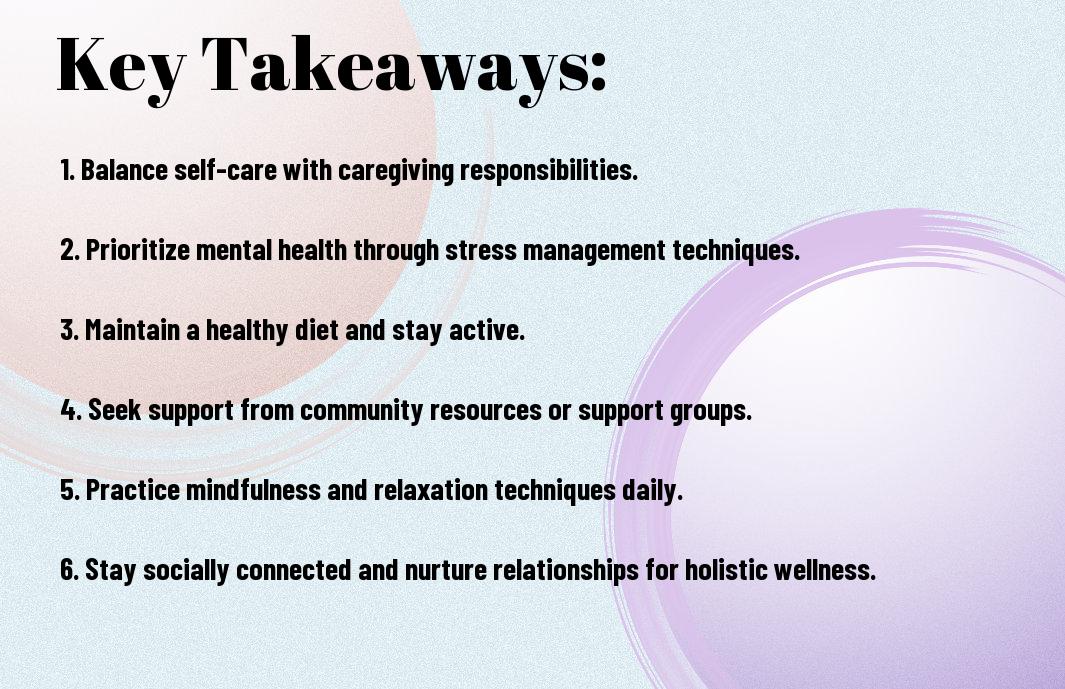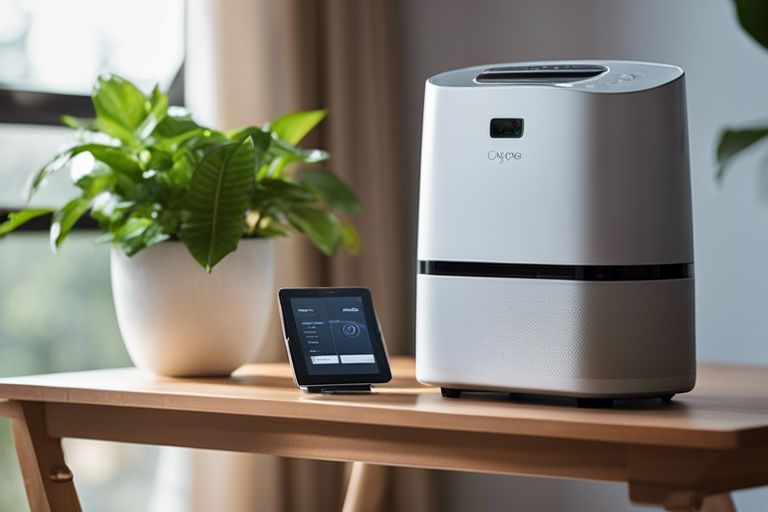Holistic wellness for primary caregivers goes beyond physical health, encompassing mental, emotional, and spiritual well-being. In this guide inspired by Deepak Chopra’s approach, we explore practical and transformative tips to help caregivers nurture themselves while caring for others. From self-care practices to mindful exercises, these holistic tips will empower caregivers to maintain balance and vitality amidst their demanding roles.

Key Takeaways:
- Self-care: Primary caregivers must prioritize their own well-being by practicing self-care activities like meditation, exercise, and setting boundaries.
- Support system: Building a strong support network of friends, family, or support groups can help caregivers feel less isolated and overwhelmed.
- Healthy diet: Eating nutritious foods and staying hydrated is crucial for maintaining energy levels and overall health while caring for others.
- Physical activity: Incorporating regular exercise into a caregiver’s routine can reduce stress, improve mood, and boost physical strength and endurance.
- Mental health: Seeking professional help or therapy when needed is important for caregivers to manage stress, anxiety, and other mental health challenges that may arise.

Self-Care Strategies
While caregiving can be a rewarding experience, it can also be physically and emotionally draining. As a primary caregiver, it’s crucial to prioritize self-care to avoid burnout and maintain overall well-being. Implementing self-care strategies can help you recharge and better support your loved one.
Mindfulness and Meditation Practices
An crucial self-care strategy for primary caregivers is to incorporate mindfulness and meditation practices into their daily routine. Mindfulness involves being present in the moment and paying attention to thoughts and feelings without judgment. Meditation, on the other hand, focuses on quieting the mind and promoting relaxation. By practicing mindfulness and meditation, caregivers can reduce stress, improve mental clarity, and enhance their overall sense of well-being.
It’s important for caregivers to set aside time each day for mindfulness and meditation. This can be as short as a few minutes or as long as an hour, depending on what works best for you. Find a quiet and peaceful space where you can sit comfortably and focus on your breath. Allow yourself to let go of worries and distractions, and simply be in the present moment.
Additionally, there are many guided meditation apps and online resources available to help caregivers get started with their practice. These tools can provide structure and guidance for those who are new to mindfulness and meditation. By making these practices a regular part of your self-care routine, you can cultivate inner peace and resilience to better cope with the demands of caregiving.
Prioritizing Sleep and Rest
Rest is another crucial aspect of self-care for primary caregivers. It’s common for caregivers to sacrifice their own sleep and rest to attend to the needs of their loved ones. However, neglecting your own need for rest can lead to exhaustion and impaired decision-making. Prioritizing quality sleep and rest is crucial for replenishing your energy and maintaining good health.
Make it a priority to establish a bedtime routine that promotes relaxation and restful sleep. This may include turning off electronic devices, creating a calming environment, and practicing relaxation techniques before bed. Aim to get at least 7-8 hours of sleep each night to support your physical and mental well-being. If you’re having trouble sleeping, consider speaking with a healthcare provider for guidance and support.
In addition to nighttime sleep, it’s also beneficial to incorporate short breaks and moments of rest throughout the day. Even a brief nap or relaxation period can help rejuvenate your body and mind, making you more equipped to handle the challenges of caregiving. Recall, taking care of yourself allows you to provide better care for your loved one in the long run.
Nourishing the Body
Healthy Eating Habits for Caregivers
To ensure optimal health and well-being, caregivers must prioritize healthy eating habits. This includes consuming a balanced diet rich in fruits, vegetables, whole grains, lean proteins, and healthy fats. To sustain energy levels throughout the day, caregivers should aim to eat regular, nutrient-dense meals and snacks. Planning meals ahead of time and having healthy options readily available can help caregivers make better food choices even during busy days.
Additionally, mindful eating practices such as paying attention to hunger and fullness cues, savoring each bite, and avoiding distractions while eating can enhance digestion and overall satisfaction with meals. By nourishing the body with wholesome foods, caregivers can better manage stress, boost immunity, and maintain a healthy weight, ultimately improving their quality of life.
Furthermore, it’s vital for caregivers to drink plenty of water throughout the day to stay hydrated and support cellular function. Hydration is key to maintaining energy levels, cognitive function, and overall well-being. By incorporating herbal teas, infused water, or electrolyte-rich beverages into their daily routine, caregivers can enhance hydration and promote optimal health.
Staying Hydrated and Managing Stress
An integral part of holistic wellness for caregivers involves staying hydrated and effectively managing stress. Dehydration can lead to fatigue, headaches, and poor concentration, impacting the caregiver’s ability to provide optimal care. By prioritizing regular fluid intake and choosing hydrating foods like fruits and vegetables, caregivers can support their body’s vital functions and promote overall health.
For instance, incorporating stress-reducing practices such as meditation, deep breathing exercises, yoga, or spending time in nature can help caregivers alleviate stress and improve their emotional well-being. By dedicating time each day to relaxation and self-care, caregivers can enhance their resilience, prevent burnout, and cultivate a greater sense of balance and harmony in their lives.

Emotional Balance
Many primary caregivers experience a wide range of emotions while taking on the responsibility of caring for a loved one. It’s necessary to prioritize emotional balance to ensure your well-being while supporting others. Emotional balance involves recognizing and processing feelings in a healthy way, so they don’t build up and lead to burnout or emotional exhaustion.
Building a Support Network
To maintain emotional balance, primary caregivers must focus on building a strong support network. This network can consist of friends, family members, support groups, therapists, or counselors who can provide emotional support, listening ears, and helpful advice. Having a support system in place allows caregivers to share their feelings, concerns, and challenges with others who understand their unique situation.
Additionally, joining caregiver support groups or community organizations can help caregivers connect with others facing similar challenges. These groups provide a safe space to share experiences, learn coping mechanisms, and form meaningful connections. By building a support network, caregivers can alleviate feelings of isolation, reduce stress, and promote emotional well-being.
Self-care activities, such as practicing mindfulness, meditation, journaling, or engaging in hobbies, can also contribute to emotional balance. Taking breaks, setting boundaries, and prioritizing personal needs are necessary aspects of self-care for primary caregivers.
Managing Grief and Loss
Loss is a natural part of the caregiving journey, whether it involves the decline of a loved one’s health, changes in their abilities, or eventual loss. Managing grief and loss is crucial for primary caregivers to maintain emotional balance and overall well-being. It’s normal to experience grief, sadness, anger, or frustration when facing the realities of caregiving.
Managing grief and loss involves acknowledging and processing these complex emotions in a healthy way. Caregivers can seek support from therapists, grief counselors, or spiritual advisors to navigate the grieving process effectively. Additionally, practicing self-compassion, self-reflection, and self-care can help caregivers cope with the emotional toll of caregiving.
By understanding the grieving process and seeking support when needed, primary caregivers can honor their feelings, find healthy ways to cope, and continue providing care from a place of emotional balance and strength.
To wrap up
Hence, it is crucial for primary caregivers to prioritize their holistic wellness in order to effectively care for their loved ones. By incorporating practices such as mindfulness meditation, healthy eating habits, regular exercise, adequate rest, and seeking social support, caregivers can cultivate a balanced and sustainable lifestyle. It is important for caregivers to regularly check-in with themselves and assess their own well-being to prevent burnout and maintain a strong foundation for caregiving.
As primary caregivers navigate the challenges of caring for others, it is important for them to remember that self-care is not selfish but necessary for their overall well-being. By implementing holistic wellness tips into their daily routines, caregivers can create a harmonious balance between caring for others and themselves. This approach will not only benefit the caregivers but also positively impact those under their care, fostering a healthier and more nurturing environment for all.
For more tips on building holistic wellness for both children and parents, I recommend checking out the article on Building Holistic Wellness: Tips for Children and Parents. By taking small steps towards holistic wellness, primary caregivers can enhance their overall quality of life and create a positive impact on the well-being of those they care for. Bear in mind, by prioritizing your wellness, you are better equipped to provide the best care for your loved ones.
FAQ
Q: What is the importance of holistic wellness for primary caregivers?
A: Holistic wellness is imperative for primary caregivers as it focuses on caring for the mind, body, and spirit as a whole. This approach helps caregivers maintain balance, reduce stress, and cultivate resilience.
Q: How can primary caregivers practice self-care in a holistic way?
A: Primary caregivers can practice self-care holistically by incorporating activities such as meditation, exercise, healthy eating, adequate sleep, and mindfulness practices into their daily routine.
Q: What are some holistic wellness tips for primary caregivers to reduce stress?
A: To reduce stress, primary caregivers can try techniques like deep breathing exercises, yoga, aromatherapy, spending time in nature, and journaling to promote relaxation and emotional well-being.
Q: How can primary caregivers prioritize their mental health and emotional well-being?
A: Primary caregivers can prioritize their mental health and emotional well-being by seeking support from friends, family, support groups, or a therapist, practicing gratitude, setting boundaries, and engaging in activities that bring them joy.
Q: Why is it important for primary caregivers to practice holistic wellness?
A: Practicing holistic wellness is crucial for primary caregivers as it helps them maintain their own well-being, prevent burnout, foster resilience, and provide better care for their loved ones.



